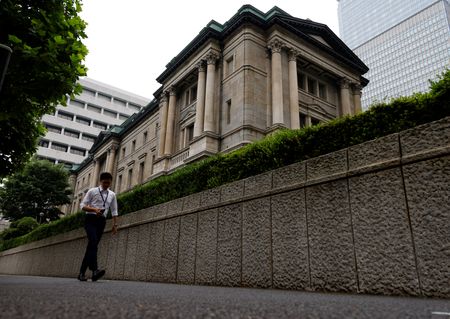 1
1 1
1
By Leika Kihara and Yoshifumi Takemoto
TOKYO (Reuters) – The Bank of Japan (BOJ) is set to keep monetary policy steady on Friday and may struggle to raise interest rates off their ultra-low levels this year due to the weak economy, the country’s former top currency diplomat Hiroshi Watanabe said on Wednesday.
With inflation exceeding the BOJ’s 2% target, some market players bet the central bank will phase out its controversial bond yield control policy as early as this week’s meeting.
“The BOJ has no reason to move this week,” with markets jittery of global banking-sector woes and recent data in Japan showing souring business sentiment, said Watanabe, who retains close contacts with incumbent policymakers.
“In fact, the BOJ might find it hard to raise rates for the rest of this year,” as inflation is set to slow below the bank’s 2% target in coming months, he told Reuters in an interview.
If the BOJ were to hike rates next year, it would have to do so when U.S. and European central banks may start cutting rates to support their economies hit by aggressive monetary tightening now under way to combat soaring inflation, Watanabe said.
The resulting interest-rate differential could trigger a spike in the yen to around 115 to the dollar from current levels around 135, he said.
“It will be a question of whether Japan can tolerate such yen rises, and whether the BOJ and the government can explain to the public the need to take such a step,” Watanabe said.
Under yield curve control (YCC), the BOJ sets a -0.1% target for short-term interest rates and caps the 10-year bond yield around zero as part of efforts to sustainably push up inflation to its 2% target.
New BOJ Governor Kazuo Ueda has stressed the need to keep policy ultra-loose for now, arguing that the recent cost-driven inflation will peter out in coming months.
But he has also signaled the chance of tweaking YCC, which has drawn criticism for causing distortions in the shape of Japan’s bond yield curve and crushing commercial banks’ profits.
(Reporting by Leika Kihara; Editing by Simon Cameron-Moore)